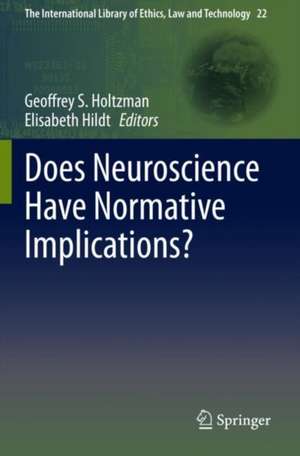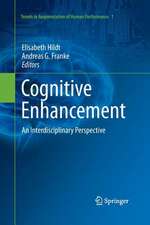Does Neuroscience Have Normative Implications?: The International Library of Ethics, Law and Technology, cartea 22
Editat de Geoffrey S. Holtzman, Elisabeth Hildten Limba Engleză Paperback – 2 noi 2021
| Toate formatele și edițiile | Preț | Express |
|---|---|---|
| Paperback (1) | 679.55 lei 6-8 săpt. | |
| Springer International Publishing – 2 noi 2021 | 679.55 lei 6-8 săpt. | |
| Hardback (1) | 685.62 lei 6-8 săpt. | |
| Springer International Publishing – noi 2020 | 685.62 lei 6-8 săpt. |
Din seria The International Library of Ethics, Law and Technology
- 15%
 Preț: 686.57 lei
Preț: 686.57 lei - 20%
 Preț: 962.91 lei
Preț: 962.91 lei - 15%
 Preț: 629.83 lei
Preț: 629.83 lei - 15%
 Preț: 630.64 lei
Preț: 630.64 lei - 18%
 Preț: 767.20 lei
Preț: 767.20 lei -
 Preț: 374.37 lei
Preț: 374.37 lei - 15%
 Preț: 634.64 lei
Preț: 634.64 lei -
 Preț: 374.76 lei
Preț: 374.76 lei -
 Preț: 387.52 lei
Preț: 387.52 lei - 15%
 Preț: 574.38 lei
Preț: 574.38 lei - 15%
 Preț: 571.48 lei
Preț: 571.48 lei - 5%
 Preț: 1076.57 lei
Preț: 1076.57 lei - 15%
 Preț: 569.57 lei
Preț: 569.57 lei - 15%
 Preț: 577.25 lei
Preț: 577.25 lei - 18%
 Preț: 710.76 lei
Preț: 710.76 lei - 15%
 Preț: 629.70 lei
Preț: 629.70 lei - 15%
 Preț: 627.43 lei
Preț: 627.43 lei -
 Preț: 288.27 lei
Preț: 288.27 lei - 24%
 Preț: 644.82 lei
Preț: 644.82 lei - 18%
 Preț: 722.03 lei
Preț: 722.03 lei - 15%
 Preț: 627.43 lei
Preț: 627.43 lei - 15%
 Preț: 623.26 lei
Preț: 623.26 lei - 15%
 Preț: 625.34 lei
Preț: 625.34 lei - 5%
 Preț: 698.75 lei
Preț: 698.75 lei - 15%
 Preț: 624.89 lei
Preț: 624.89 lei
Preț: 679.55 lei
Preț vechi: 799.47 lei
-15% Nou
Puncte Express: 1019
Preț estimativ în valută:
130.09€ • 135.42$ • 107.10£
130.09€ • 135.42$ • 107.10£
Carte tipărită la comandă
Livrare economică 31 ianuarie-14 februarie 25
Preluare comenzi: 021 569.72.76
Specificații
ISBN-13: 9783030561369
ISBN-10: 3030561364
Ilustrații: XV, 211 p. 1 illus.
Dimensiuni: 155 x 235 mm
Greutate: 0.33 kg
Ediția:1st ed. 2020
Editura: Springer International Publishing
Colecția Springer
Seria The International Library of Ethics, Law and Technology
Locul publicării:Cham, Switzerland
ISBN-10: 3030561364
Ilustrații: XV, 211 p. 1 illus.
Dimensiuni: 155 x 235 mm
Greutate: 0.33 kg
Ediția:1st ed. 2020
Editura: Springer International Publishing
Colecția Springer
Seria The International Library of Ethics, Law and Technology
Locul publicării:Cham, Switzerland
Cuprins
1. The Neuroscience of Human Morality: Three Levels of Normative Implications (Jon Leefmann).- 2. Moral Responsibility and Perceived Threats from Neuroscience (Myrto Mylopoulos).- 3. Lessons for Ethics from the Science of Pain (Jennifer Corns and Robert Cowan).- 4. Two Theories of Moral Cognition (Julia Haas).- 5. Rethinking Moral Motivation: How Neuroscience Supports an Alternative to Motivation Internalism (Chris Zarpentine).- 6. The Reactive Roots of Retribution: Normative Implications of the Neuroscience of Punishment (Isaac Wiegman).- 7. Normative Implications of Neuroscience and Sociobiology – Intended and Perceived (Ullica Segerstrale).- 8. Nervous Norms (Matthew Ruble).- 9. Neuromodulation of the “Moral Brain” – Evaluating Bridges Between Neural Foundations of Moral Capacities and Normative Aims of the Intervention (Christian Ineichen and Markus Christen).- 10. Autistic Moral Agency and Integrative Neuroethics (Bongrae Seok).
Notă biografică
Geoffrey S. Holtzman received his BA in Cognitive Science from Vassar College in 2007 and his PhD in Philosophy from CUNY Graduate Center in 2014. After completing his dissertation on the experimental philosophy of faultless disagreement, he undertook a fellowship in neuroethics at the Illinois Institute of Technology, followed by a fellowship in moral psychology at Geisinger Health System. He most recently taught courses in neuroethics and moral psychology as a faculty member at Franklin & Marshall College.
Elisabeth Hildt is Professor of Philosophy and Director of the Center for the Study of Ethics in the Professions at Illinois Institute of Technology, Chicago. Her research focus is on neuroethics, ethics of technology, and Science and Technology Studies. Before moving to Chicago, she was the head of the Research Group on Neuroethics/Neurophilosophy at the University of Mainz, Germany.
Elisabeth Hildt is Professor of Philosophy and Director of the Center for the Study of Ethics in the Professions at Illinois Institute of Technology, Chicago. Her research focus is on neuroethics, ethics of technology, and Science and Technology Studies. Before moving to Chicago, she was the head of the Research Group on Neuroethics/Neurophilosophy at the University of Mainz, Germany.
Textul de pe ultima copertă
This book brings together a number of essays that are optimistic about the ways certain neuroscientific insights might advance philosophical ethics, and other essays that are more circumspect about the relevance of neuroscience to philosophical ethics. As a whole, the essays form a self-reflective body of work that simultaneously seeks to derive normative ethical implications from neuroscience, and to question whether and how that may be possible at all. In doing so, the collection brings together psychology, neuroscience, philosophy of mind, ethics, and philosophy of science. Neuroscience seeks to understand the biological systems that guide human behavior and cognition. Normative ethics, on the other hand, seeks to understand the system of abstract moral principles dictating how people ought to behave. By studying how the human brain makes moral judgments, can philosophers learn anything about the nature of morality itself? A growing number of researchers believe that neurosciencecan, indeed, provide insights into the questions of philosophical ethics. However, even these advocates acknowledge that the path from neuroscientific is to normative ethical ought can be quite fraught.
Caracteristici
The only collection dedicated exclusively to essays addressing the implications of neuroscience for philosophical ethics Brings together the philosophical subdisciplines of ethics and philosophy of cognitive science to appeal to readers with either specialization An especially timely volume in a growing interdisciplinary field




















